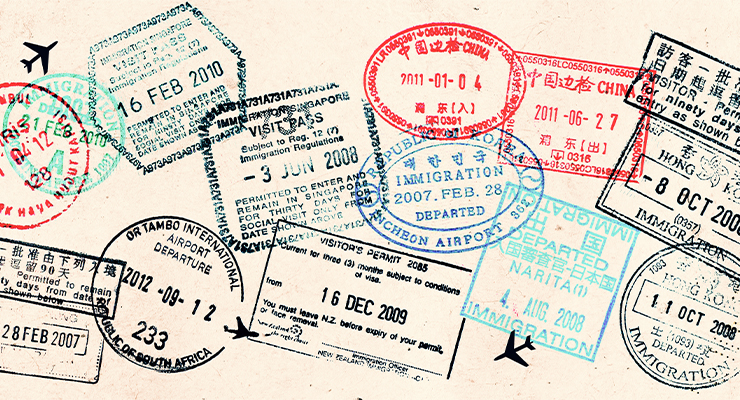
Our world is unfathomably vast. Tropical Brazil couldn’t be any more different from subarctic Canada or Saharan Morocco, and the ways cultures have adapted to thrive in each of these landscapes vary dramatically. Still, no matter our differences, we are all humans, and learning from one another is our specialty.
These facts give world travel an undeniable romance, filling many people with wanderlust: a strong longing to explore. And there is no better way for students to quench their wanderlust than by studying abroad!
Students who study abroad take university classes internationally for a set period, which can range from the week of Spring Break to an entire semester — or more! They get to immerse themselves in a different environment and culture, grow past their limits, and create lifelong friendships and memories, all while earning academic credit toward their degree.
Study abroad programs are more accessible than you might realize, and many of your preconceptions about study abroad programs may not match the reality. In this article, you’ll get a crash course in the stuff you need to know about studying abroad. Fasten your seatbelts and keep your tray tables in the upright position: It’s time to go global!
A Brief History of Study Abroad Programs
The practice of traveling to learn is nothing new: over 2,500 years ago, Greek philosopher Pythagoras (a.k.a. “Captain Hypotenuse”) made a pilgrimage to Egypt to advance his understanding of astronomy and mathematics, though he was apparently a rare exception in his time.
The guy who really deserves credit for inventing the practice of studying abroad as we know it today was Emo of Friesland, who left northern Holland in 1190 to study at Oxford University. Unfortunately, in the Middle Ages, only the rich, like Emo, could afford to travel to study.
Finally, in 1754, Swiss diplomat Emmerich de Vattel urged nations to exchange professors and ideas with one another in the classroom, believing that all people benefited from the betterment of the societies around them, not just their own.
By 1835, the first international student to arrive in America, John Diomatari of Greece, attended the University of Georgia, eventually applying his study abroad experience as director of the American consulate in Athens (Greece, not Georgia).
Before the end of the nineteenth century, Indiana University was offering faculty-led “summer tramps” abroad that granted students college credits. As travel became easier throughout the twentieth century, studying abroad became more common than ever before. By the time the American government established the Fulbright Program in 1946, people worldwide grasped the benefits of study abroad programs. Today, over 300,000 Americans study abroad each year.
As Senator Fulbright eloquently stated, “Educational exchange can turn nations into people, contributing as no other form of communication can to the humanizing of international relations.”
Lofty ideals, to be sure. But how does this apply to you, a student in the twenty-first century? Are there more direct benefits of studying abroad?
Students Gain Advantages from Study Abroad Programs
To study abroad is to step outside your comfort zone in a big way, and the students bold enough to make this commitment are rewarded for it.
According to the U.S. State Department, which oversees international relations, “When young Americans study abroad, they gain important skills and develop personal networks that enhance their prospects in the world’s marketplace and their potential as global problem-solvers.”
Students who have returned from study abroad programs confirm this. The Institute for International Education of Students (IES) conducted the largest survey of study abroad alumni to date, which found:
- 98% reported gaining a better understanding of their own cultural values
- 97% credited studying abroad for increasing their maturity
- 96% reported that their self-confidence improved as a result of studying abroad
- 86% reported that studying abroad shaped their subsequent educational experiences
- 75% acquired skills that influenced their career path
It’s clear that studying abroad has an overwhelmingly positive effect on the social, academic, and professional future of students. Let’s examine why.
An Opportunity to Explore the World
Travel is appealing, but it can demand a lot of time. As a student, you likely have more time and fewer responsibilities now than you will over the next few decades of your life. That level of flexibility makes this the perfect time to see the world.
Studying abroad takes the uncertainty out of traveling. You know exactly where you’re going, for how long, and how much it costs, all up-front, and people are waiting excitedly to welcome your arrival. It’s not all classroom lectures, either; you’ll have plenty of downtime to explore the surrounding area and make yourself at home, just like stateside, but you’ll be venturing into Milan, Amsterdam, or London.
Furthermore, most study abroad programs plan excursions that take students to experience some of the most remarkable places on Earth. Show up for class, then go offroad across the Mongolian steppes. Rollerblade up the coast in Montevideo. Hike through Banff National Park, ride a gondola through Venetian canals, or ascend Icelandic volcanoes. The world is yours, and there will never be a better time to stake your claim.
A Chance to Broaden Your Worldview
Amanda Maurer, USF’s Director of Education Abroad, stressed that experiences while studying abroad not only teach students a lot about the places they visit, but help them learn just as much about their own culture and themselves.
“Our culture creates blinders — everyone’s culture does,” she said. “We see the world through our own lens, and the person sitting next to us when we go abroad has their own lens, too. Prepare for that. Realize that the United States is very different from other countries — even those countries where we may share the same language.”
“Embrace the cultures you encounter, recognizing that each holds its own set of values and treasures,” advised USF junior Mai Tran, who spent six weeks studying abroad in Florence, Italy.
A Whole New World of Friendships
While studying abroad, students make strong, lifelong friendships, not only with the people in their cohort, but locals they meet day-to-day.
It’s practically unavoidable when you live in a city for a long time, even overseas. For example, Tran recounted visiting the local Florentine sandwich shop every day after class, becoming friends with the owners over time. She cherished the opportunity to form such a deep connection with people she met far away from home.
You’ll bring friends back with you, too. Even if you don’t know the other study abroad students in your cohort at the start of your adventure, it’s natural to form a community, especially when it can take time to feel at home. Shared experiences forge powerful bonds!
A Way to Develop Soft Skills
Everyone has certain soft skills, typically emerging from their personality or character. While they can be difficult to precisely define, examples include problem solving, critical thinking, teamwork, and adaptability. They are commonly viewed as innate talents that each person possesses to varying extents.
No matter your field, soft skills are critical to successful cooperation. You can develop them by stepping outside your comfort zone and testing your limits. While abroad, you’ll rely on soft skills to get by, strengthening them in the process.
Maurer has found that students are primarily focused on the career benefits of studying abroad, and her team makes it clear that the personal development that occurs abroad makes a huge difference when you enter the workforce. Study abroad students gain independence and resourcefulness through navigating unfamiliar situations. “Confronting the unknown gives you maturity and confidence,” she said.
USF senior Deeya Patel, who also studied abroad in Florence for six weeks, shared Maurer’s view. “Navigating the streets, ordering daily cappuccinos in Italian, and engaging with locals in Lake Como challenged me to step out of my comfort zone and embrace the unknown,” Patel recalled. “The experience was not just about exploring a new country but also about self-discovery and personal growth.”
Nurturing your soft skills now is likely to pay off later. Forbes predicts, “As more and more job activities become automated, soft skills, which cannot yet be replicated by machines, have become more important.” And the trend isn’t slowing down. Deloitte expects that “soft skill-intensive occupations will account for two-thirds of all jobs by 2030.”
A Gateway to Top-Tier Academics
You don’t compromise the quality of your education when you study abroad. The opposite is true! Study abroad programs frequently give students access to some of the top universities and educators around the world.
USF has relationships with distinguished universities across the globe, like Exeter and Nottingham in the United Kingdom, Macquarie in Australia, and Yonsei in South Korea. USF’s faculty-led programs are well-regarded, too.
“We have people applying from across the United States to go on our Paris dance program,” Maurer said, “because Michael Foley [USF dance professor] has done an incredible job providing an opportunity that students would never be able to have without his years of experience and thoughtful curation.”
Moreover, the fresh academic environment that you enter on a study abroad trip “can ignite your passion for learning,” Kingston University explains. “Different teaching methods and perspectives challenge your traditional ways of thinking.”
Even if your study abroad program doesn’t send you to a world-renowned university, your academic performance will still get a boost. “Students who study abroad tend to have better graduation rates and tend to also do better academically,” Maurer said. “During the program and afterward, it sets them on a different trajectory.”
That new trajectory might lead you to an exciting new major. Maurer recalled one USF sophomore who studied abroad in the Galapagos Islands, gaining an interest in marine biology. “James Cook University in Australia is one of the top marine science schools in the world, so she studied there next — right next to the Great Barrier Reef!” Study abroad programs made that amazing opportunity accessible.
An Undeniable Boost to Your Resume
Studying abroad is a home run for your career. According to the Council on International Educational Exchange (CIEE), “Studies show 97% of students who study abroad find employment within twelve months of graduation and 25% earn higher salaries than their peers.”
Besides being equipped with highly developed soft skills, resumes that include study abroad experiences stand out in a crowded pool of applicants. For example, doing a summer internship internationally can set you up for a different, career-focused internship later. Maurer painted the picture of a job interview where an intrigued employer asked about a candidate’s six-week internship in Barcelona.
“When you tell them about that kind of experience, it sets you apart,” she said. After all, relatively few people take that leap.
While abroad, you’ll also make deeper connections with faculty that will prove helpful as you apply for graduate school, and the networking you do internationally will broaden your long-term prospects. The economy is more global than ever, so international contacts are a huge advantage.
The Different Types of Study Abroad Programs
There are several kinds of study abroad programs for undergrads. Which one you pick depends on your goals — and where you want to go.
Faculty-Led
This is the most common kind of study abroad program. Faculty-led programs are created when a professor pitches a new way to academically enrich their students through travel. Maybe they want to bring students somewhere their discipline has a rich history, like exploring culinary arts in Greece, or the Paris dance program mentioned earlier.
In other cases, the faculty member has a connection with a foreign university that is willing to facilitate access. Either way, the professor’s pitch is reviewed by their department and college, and if it meets the right criteria, a program is created.
“Going with a faculty member who has thought about the degree plan of the students, making it very seamless, helps you have an incredible experience in the country,” Maurer contended. “Their whole desire is to expose students to those unique and wonderful, enriching experiences.”
Bilateral Exchange
Bilateral exchange programs are partnerships between universities. Schools seek out partnerships to expand their students’ options.
The partnerships USF has with Exeter, Yonsei, etc., are examples of bilateral exchange: each university sends students to the other for a semester abroad.
Maurer emphasized the importance of credit transfers when universities choose partners. Her department ensures that students take courses abroad that they can successfully bring back for USF credit, and vice versa, especially when a degree is sequential or cohort-based.
Affiliate
What if your university doesn’t offer the study abroad program you’re seeking? That’s where affiliate programs come in. Students don’t necessarily have to join a program organized by their university. Instead, their university can use its connections to refer the student to a compatible program organized by another school.
So, while USF might not be able to send you to Prague yet, the Education Abroad Department is happy to help you find a program that will. Affiliate programs expand your options significantly. Don’t hesitate to ask about them if you have a specific destination in mind!
Choosing a Study Abroad Destination
With the whole wide world to choose from, how can you determine which study abroad destination is right for you?
Your goals and interests can lead you to an answer. Maurer advises students to compare study abroad programs, focusing on the quality of the academic credits offered and the experience they expect to have in each location. Your advisor can help you determine whether a destination is compatible with your degree, too.
There are clear trends. “The majority of USF students end up going to Western Europe,” Maurer revealed, “and that’s typical across the United States. Most Americans want to go to Western Europe.”
Maurer’s observation is backed up by the most recent Open Doors report from the Institute of International Education (IIE). According to the data, the top five study abroad destinations for U.S. students are:
- Italy
- United Kingdom
- Spain
- France
- Germany
Costa Rica lands the top spot among other regions at seventh place, with South Korea rounding out the top ten.
Maurer hopes students will be imaginative when planning, realizing that, even if a destination feels strange to them, support systems are in place to make sure it’s friendly. “I want students to think, for example, ‘Maybe I would go to Chile.’ You’ll have faculty there that have experience. We have on-site staff. We do risk reviews. That’s our process.” So, think outside the box!
While nontraditional options can be more transformative, any study abroad experience is worthwhile. “We have students come back from places like Florence or London — two of the most popular study abroad destinations — and it has changed their life.”
That was the experience of USF senior Angela Pena. She shared a memory of watching the sunset at Plaza Michelangelo in Florence, surrounded by new friends as live music echoed around the square. “I remember crying from joy,” she said. “At that moment, I felt true peace and happiness for the first time in a long time. This made me realize that studying abroad was the most rewarding decision I have ever made.”
Busting Study Abroad Myths
A lot of people have misconceptions about studying abroad that affect their willingness to participate. Let’s examine a few and discover the truth about each (valid) concern.
Myth #1: It Costs More Than I Can Afford
While it’s true that the study abroad price tag can be shocking, for most students, it’s actually about as affordable as a semester in the U.S.
Studying at a university abroad carries most of the same expenses that apply here in the U.S., like tuition, housing, and food. Sometimes it adds up to a total that’s only incrementally more expensive — or sometimes less, especially for out-of-state students, who usually must pay more to attend their school of choice regardless.
Students can also use financial aid funds, which travel with them if their credits count towards a degree. There are many scholarships dedicated to study abroad programs, too, especially if you’re a Pell-eligible student. And save money for your study abroad program if you can. All these funding sources chip away at that big total, just like they would reduce your tuition at an American university.
Myth #2: I Wouldn’t Be Able to Adapt
Maybe you believe that you wouldn’t be comfortable in a different country and would find it difficult to enjoy. “We have some students who say they just can’t imagine being away for that long,” Maurer admitted. “I still say: stretch! Try, because you can. Most people can be away for just three months. If that’s too long, you can try a Spring Break program or a May intersession program.
“If someone says, ‘This isn’t right for me,’ then it’s not. All I would say is to explore your feelings: Why wouldn’t it be right for you?” If you can identify what’s really holding you back, you might be able to get advice that can help you overcome those fears.
Maurer encouraged students to scroll through her department’s Instagram feed (@usfedabroad) for inspiration. Her team has shared real photos from hundreds of study abroad programs, and they promote new opportunities that might pique your interest.
Students can also gain insight by speaking to USF’s GloBull Ambassadors (GBAs), study abroad alumni who act as informal advisors for students interested in studying abroad. Tran, Patel, and Pena are all members of this program. While the GBAs are exclusive to our university, others have similar programs that their students can benefit from.
Myth #3: Study Abroad is Only for Arts and Humanities
There is a perception that study abroad programs are limited to certain majors. The common view has been that it’s only for studies in the arts or humanities. Maurer said that’s untrue: “We have people studying biochemistry in Florence over the summer.” Faculty-led programs can cover a wide range of fields, too.
In fact, the IIE’s Open Doors report also revealed that most American students abroad study:
- Business and management
- Social sciences
- Science, technology, engineering, and mathematics (STEM)
Don’t feel limited by your major; there’s a program out there for you.
Myth #4: Study Abroad Delays Graduation
Students also worry that going abroad could cause them to fall behind academically. Maurer rebutted that students who study abroad are more successful, not less. “On average, people who study abroad have better grades than the rest of campus,” she said.
Staying on track does require careful consideration, though, and the earlier you start, the easier it can be to balance. Your college advisor is in the best position to help you avoid potential academic pitfalls. With their help, you’ll need to plan out what credits you want to set aside for a study abroad experience.
How to Join a Study Abroad Program
If the prospect of studying abroad has you excited, here’s how to proceed.
The first step, according to Maurer, is to be intentional. Make it clear to your advisor: I want to study abroad. Knowing that you have that goal, they’ll work around it. Later, when it’s time for you to select your opportunity, you’ll have more options available.
Again, the sooner you start going abroad, the better. Maurer would prefer that students start studying abroad as early as freshman year, although that’s uncommon. If you begin early enough, though, you may be able to fit two or three international experiences into your college career. One USF student even did four!
After you’ve consulted your advisor, the USF Education Abroad team — or its equivalent at your school of choice — will help connect you to study abroad programs that meet your needs.
There are still more options out there. Many program providers are private; that is, not based at a university. Community review site Go Overseas has a helpful search engine that filters study abroad programs by location, subject, and timeframe.
Still, nothing beats a university that’s committed to facilitating enriching study abroad programs for as many of their students as possible. Led by Maurer, USF fits that bill.
“We want study abroad to be accessible. That is key,” she said. “We want every student to study abroad.”
In the future, Maurer plans to educate more of USF’s faculty and staff about studying abroad so that more students learn about the benefits of participating and become aware that the option is available to them.
If you want to attend a university that embraces studying abroad and highly prioritizes student success, speak to our admissions staff about how to apply to USF. They are eagerly awaiting your questions! Email admissions@usf.edu or call 813-974-3350.


